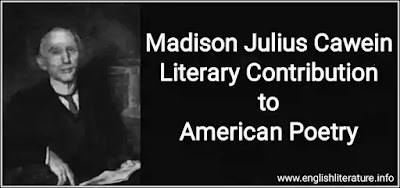Also Read
Madison Julius Cawein spent the greater part of his life in Louisville, Kentucky, where he was born in 1865 and died in 1914. He wrote more than twenty volumes of verse, the best of which he collected in five volumes (1907) and later in one volume (1911). The appreciative English critic, Edmund Gosse, in his Introduction to the 1907 collection, calls Cawein "the only hermit thrush" singing "through an interval comparatively tuneless." W. D. Howells's Foreword in the 1911 volume emphasizes Cawein's unusual power of making common things 'live and glow thereafter with inextinguishable beauty.'
Cawein actually writes much of his poetry out of doors in the presence of the nature which he is describing. His lyrics of nature are his best verse. He can even diminish the horror of a Kentucky feud by placing it among:—
"Frail ferns and dewy mosses and dark brush,— Impenetrable briers, deep and dense, And wiry bushes,—brush, that seemed to crush The struggling saplings with its tangle, whence Sprawled out the ramble of an old rail-fence."
In his verses the catbird nests in the trumpet vine, the pewee pours forth a woodland welcome, the redbird sings a vesper song, the lilacs are musky of the May, the bluebells and the wind flowers bloom. We hear
"… tinkling in the clover dells, The twilight sound of cattle bells."
His verse often shows exactness of observation, characteristic of modern students of nature, as well as a romantic love of the outdoor world. Note the specific references to the shape and color of individual natural objects in these lines from Cawein:—
"May-apples, ripening yellow, lean With oblong fruit, a lemon-green, Near Indian-turnips, long of stem, That bear an acorn-oval gem."
He loves the nymphs of mythology, the dryads, naiads, and the fairies. One of his poems is called There Are Fairies:—
"There are fairies, I could swear I have seen them busy where Rose-leaves loose their scented hair, * * * * * Leaning from the window sill Of a rose or daffodil, Listening to their serenade, All of cricket music made."
In luxuriance of imagery and profuse appeal to the senses, he is the Keats of the South. Lines like these remind us of the greater poet's The Eve of St. Agnes:—
"Into the sunset's turquoise marge The moon dips, like a pearly barge Enchantment sails through magic seas To fairyland Hesperides." Keats exclaims:— "O for a beaker full of the warm South." Cawein proceeds to fill the beaker from the summer of a southern land, where "The west was hot geranium-red," where "The dawn is a warp of fever, The eve is a woof of fire," and where "The heliotropes breathe drowsy musk Into the jasmine-dreamy air."
Cawein sometimes suffers from profuseness and lack of pruning, but the music, sentiment, imaginative warmth, and profusion of nature's charms in his best lyrics rouse keen delight in any lover of poetry. While he revels in the color, warmth, and joys of nature, it should also be observed that he can occasionally strike that deeper note which characterizes the great nature poets of the English race. In A Prayer for Old Age, he asks:—
"Never to lose my faith in Nature, God: But still to find Worship in trees; religion in each sod; And in the wind that breathe the universal God."
